Jinghan Ru
DermoGPT: Open Weights and Open Data for Morphology-Grounded Dermatological Reasoning MLLMs
Jan 05, 2026Abstract:Multimodal Large Language Models (MLLMs) show promise for medical applications, yet progress in dermatology lags due to limited training data, narrow task coverage, and lack of clinically-grounded supervision that mirrors expert diagnostic workflows. We present a comprehensive framework to address these gaps. First, we introduce DermoInstruct, a large-scale morphology-anchored instruction corpus comprising 211,243 images and 772,675 trajectories across five task formats, capturing the complete diagnostic pipeline from morphological observation and clinical reasoning to final diagnosis. Second, we establish DermoBench, a rigorous benchmark evaluating 11 tasks across four clinical axes: Morphology, Diagnosis, Reasoning, and Fairness, including a challenging subset of 3,600 expert-verified open-ended instances and human performance baselines. Third, we develop DermoGPT, a dermatology reasoning MLLM trained via supervised fine-tuning followed by our Morphologically-Anchored Visual-Inference-Consistent (MAVIC) reinforcement learning objective, which enforces consistency between visual observations and diagnostic conclusions. At inference, we deploy Confidence-Consistency Test-time adaptation (CCT) for robust predictions. Experiments show DermoGPT significantly outperforms 16 representative baselines across all axes, achieving state-of-the-art performance while substantially narrowing the human-AI gap. DermoInstruct, DermoBench and DermoGPT will be made publicly available at https://github.com/mendicant04/DermoGPT upon acceptance.
ASK: Adaptive Self-improving Knowledge Framework for Audio Text Retrieval
Dec 11, 2025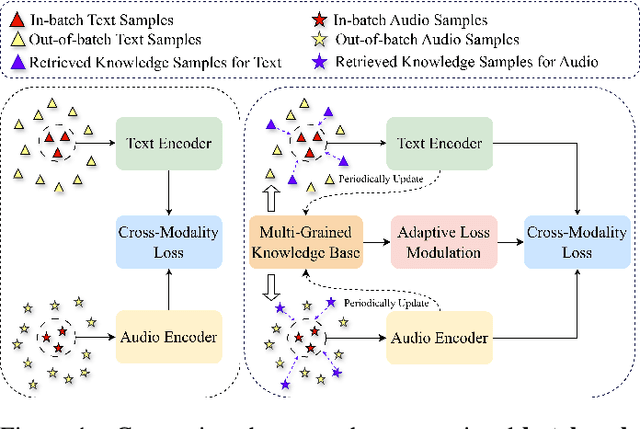
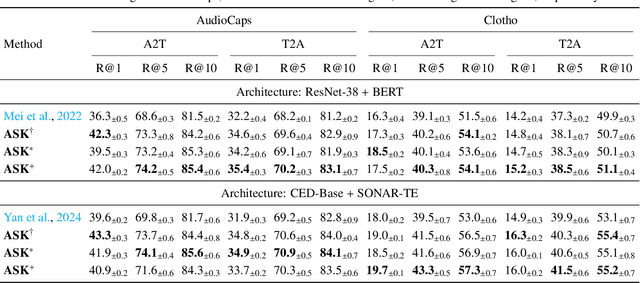
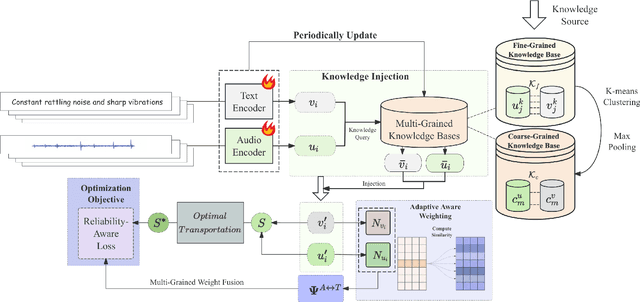

Abstract:The dominant paradigm for Audio-Text Retrieval (ATR) relies on mini-batch-based contrastive learning. This process, however, is inherently limited by what we formalize as the Gradient Locality Bottleneck (GLB), which structurally prevents models from leveraging out-of-batch knowledge and thus impairs fine-grained and long-tail learning. While external knowledge-enhanced methods can alleviate the GLB, we identify a critical, unaddressed side effect: the Representation-Drift Mismatch (RDM), where a static knowledge base becomes progressively misaligned with the evolving model, turning guidance into noise. To address this dual challenge, we propose the Adaptive Self-improving Knowledge (ASK) framework, a model-agnostic, plug-and-play solution. ASK breaks the GLB via multi-grained knowledge injection, systematically mitigates RDM through dynamic knowledge refinement, and introduces a novel adaptive reliability weighting scheme to ensure consistent knowledge contributes to optimization. Experimental results on two benchmark datasets with superior, state-of-the-art performance justify the efficacy of our proposed ASK framework.
Not All Tokens and Heads Are Equally Important: Dual-Level Attention Intervention for Hallucination Mitigation
Jun 14, 2025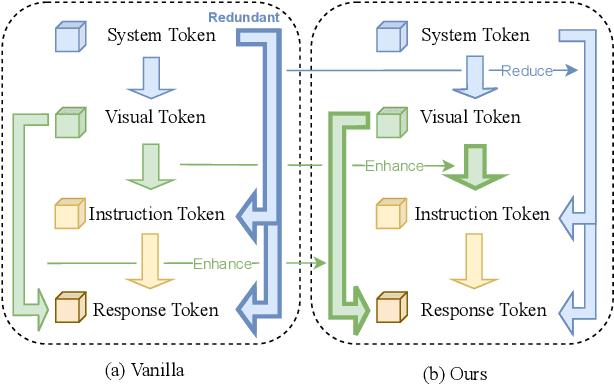

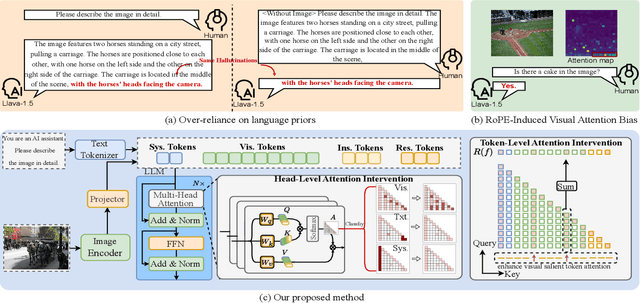

Abstract:Large vision-language models (LVLMs) have shown remarkable capabilities across a wide range of multimodal tasks. However, they remain prone to visual hallucination (VH), often producing confident but incorrect descriptions of visual content. We present VisFlow, an efficient and training-free framework designed to mitigate VH by directly manipulating attention patterns during inference. Through systematic analysis, we identify three key pathological attention behaviors in LVLMs: (1) weak visual grounding, where attention to visual tokens is insufficient or misallocated, over-focusing on uninformative regions; (2) language prior dominance, where excessive attention to prior response tokens reinforces autoregressive patterns and impairs multimodal alignment; (3) prompt redundancy, where many attention heads fixate on system prompt tokens, disrupting the integration of image, instruction, and response content. To address these issues, we introduce two inference-time interventions: token-level attention intervention (TAI), which enhances focus on salient visual content, and head-level attention intervention (HAI), which suppresses over-attention to prompt and nearby text tokens. VisFlow operates without additional training or model modifications. Extensive experiments across models and benchmarks show that VisFlow effectively reduces hallucinations and improves visual factuality, with negligible computational cost.
ATRI: Mitigating Multilingual Audio Text Retrieval Inconsistencies by Reducing Data Distribution Errors
Feb 22, 2025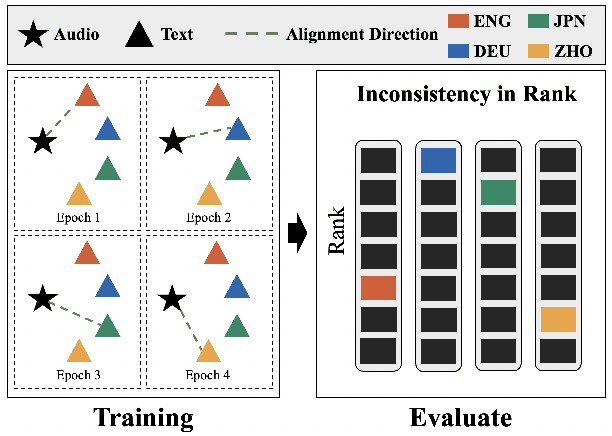
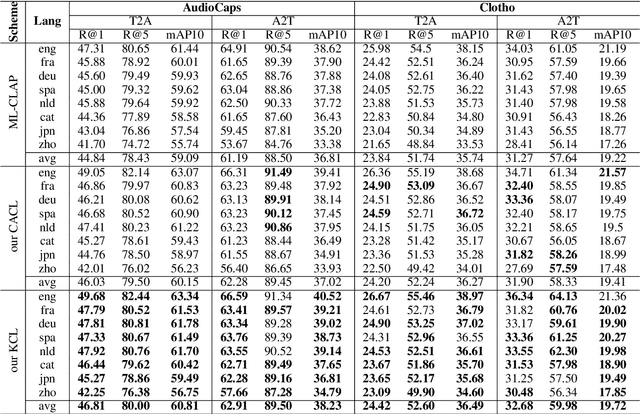
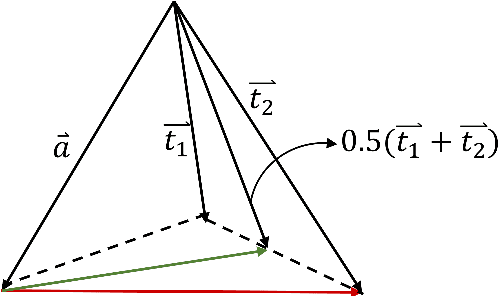
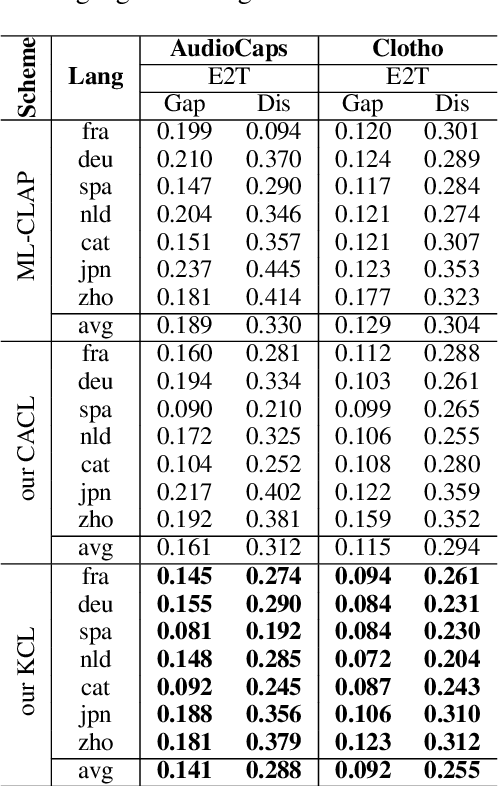
Abstract:Multilingual audio-text retrieval (ML-ATR) is a challenging task that aims to retrieve audio clips or multilingual texts from databases. However, existing ML-ATR schemes suffer from inconsistencies for instance similarity matching across languages. We theoretically analyze the inconsistency in terms of both multilingual modal alignment direction error and weight error, and propose the theoretical weight error upper bound for quantifying the inconsistency. Based on the analysis of the weight error upper bound, we find that the inconsistency problem stems from the data distribution error caused by random sampling of languages. We propose a consistent ML-ATR scheme using 1-to-k contrastive learning and audio-English co-anchor contrastive learning, aiming to mitigate the negative impact of data distribution error on recall and consistency in ML-ATR. Experimental results on the translated AudioCaps and Clotho datasets show that our scheme achieves state-of-the-art performance on recall and consistency metrics for eight mainstream languages, including English. Our code will be available at https://github.com/ATRI-ACL/ATRI-ACL.
Do we really have to filter out random noise in pre-training data for language models?
Feb 10, 2025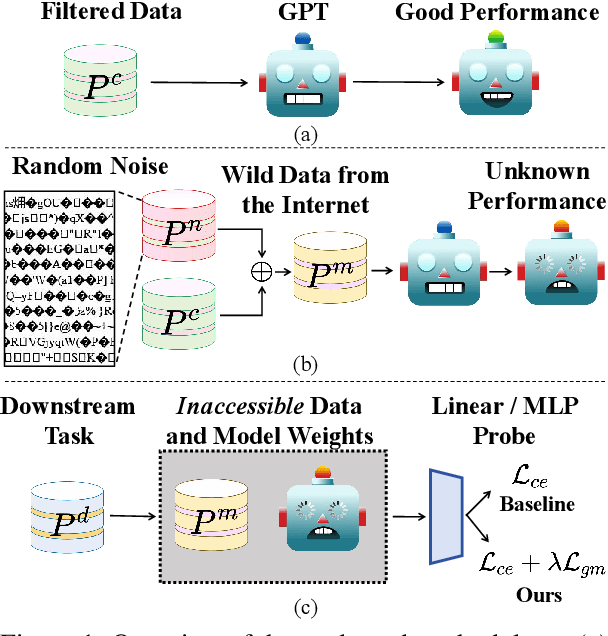



Abstract:Web-scale pre-training datasets are the cornerstone of LLMs' success. However, text data curated from the internet inevitably contains random noise caused by decoding errors or unregulated web content. In contrast to previous works that focus on low quality or synthetic data, our study \textbf{provides the first systematic investigation into such random noise through a cohesive ``What-Why-How'' framework.} Surprisingly, we observed that the resulting increase in next-token prediction (NTP) loss was significantly lower than the proportion of random noise. We provide a theoretical justification for this phenomenon, which also elucidates the success of multilingual models. On the other hand, experiments show that the model's performance in downstream tasks is not based solely on the NTP loss, which means that random noise may result in degraded downstream performance. To address the potential adverse effects, we introduce a novel plug-and-play Local Gradient Matching loss, which explicitly enhances the denoising capability of the downstream task head by aligning the gradient of normal and perturbed features without requiring knowledge of the model's parameters. Additional experiments on 8 language and 14 vision benchmarks further validate its effectiveness.
VARGPT: Unified Understanding and Generation in a Visual Autoregressive Multimodal Large Language Model
Jan 21, 2025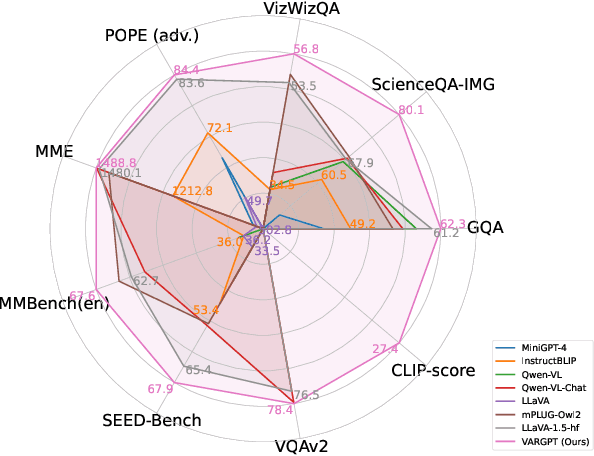
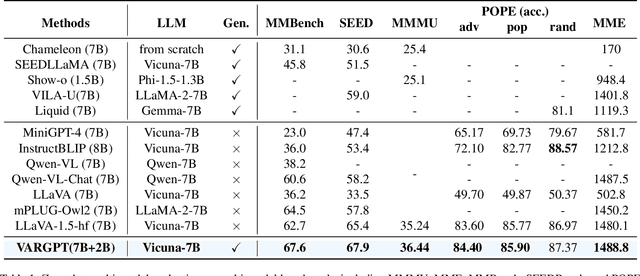
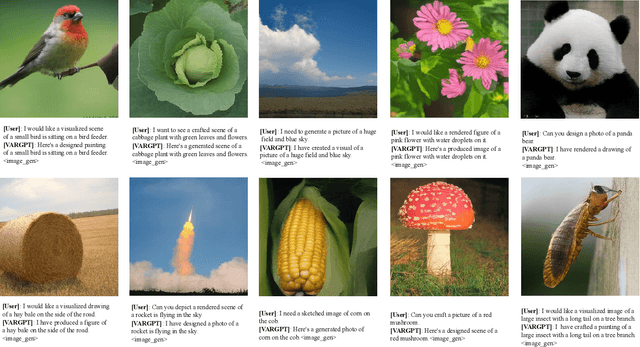
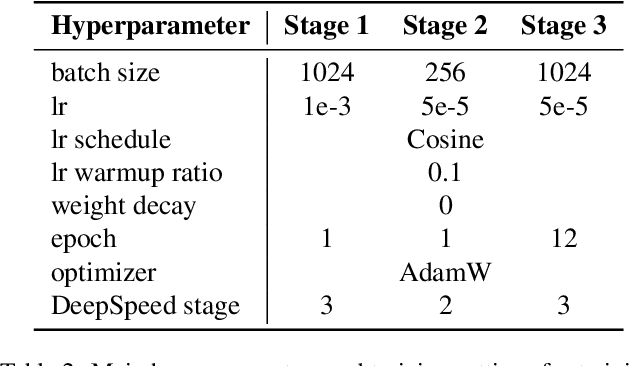
Abstract:We present VARGPT, a novel multimodal large language model (MLLM) that unifies visual understanding and generation within a single autoregressive framework. VARGPT employs a next-token prediction paradigm for visual understanding and a next-scale prediction paradigm for visual autoregressive generation. VARGPT innovatively extends the LLaVA architecture, achieving efficient scale-wise autoregressive visual generation within MLLMs while seamlessly accommodating mixed-modal input and output within a single model framework. Our VARGPT undergoes a three-stage unified training process on specially curated datasets, comprising a pre-training phase and two mixed visual instruction-tuning phases. The unified training strategy are designed to achieve alignment between visual and textual features, enhance instruction following for both understanding and generation, and improve visual generation quality, respectively. Despite its LLAVA-based architecture for multimodel understanding, VARGPT significantly outperforms LLaVA-1.5 across various vision-centric benchmarks, such as visual question-answering and reasoning tasks. Notably, VARGPT naturally supports capabilities in autoregressive visual generation and instruction-to-image synthesis, showcasing its versatility in both visual understanding and generation tasks. Project page is at: \url{https://vargpt-1.github.io/}
Imbalanced Open Set Domain Adaptation via Moving-threshold Estimation and Gradual Alignment
Mar 09, 2023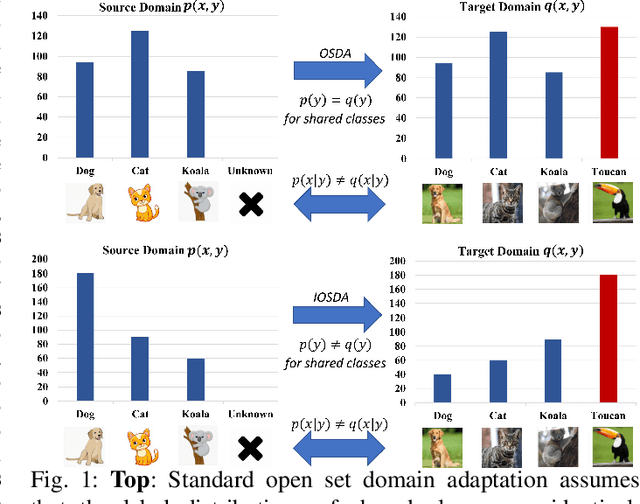
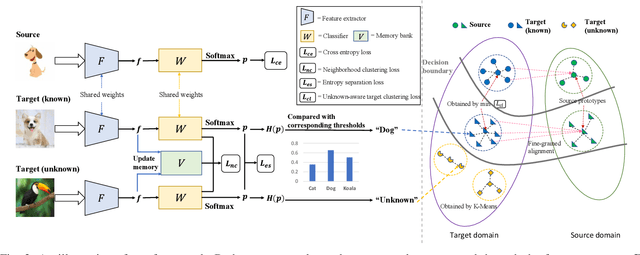


Abstract:Multimedia applications are often associated with cross-domain knowledge transfer, where Unsupervised Domain Adaptation (UDA) can be used to reduce the domain shifts. Open Set Domain Adaptation (OSDA) aims to transfer knowledge from a well-labeled source domain to an unlabeled target domain under the assumption that the target domain contains unknown classes. Existing OSDA methods consistently lay stress on the covariate shift, ignoring the potential label shift problem. The performance of OSDA methods degrades drastically under intra-domain class imbalance and inter-domain label shift. However, little attention has been paid to this issue in the community. In this paper, the Imbalanced Open Set Domain Adaptation (IOSDA) is explored where the covariate shift, label shift and category mismatch exist simultaneously. To alleviate the negative effects raised by label shift in OSDA, we propose Open-set Moving-threshold Estimation and Gradual Alignment (OMEGA) - a novel architecture that improves existing OSDA methods on class-imbalanced data. Specifically, a novel unknown-aware target clustering scheme is proposed to form tight clusters in the target domain to reduce the negative effects of label shift and intra-domain class imbalance. Furthermore, moving-threshold estimation is designed to generate specific thresholds for each target sample rather than using one for all. Extensive experiments on IOSDA, OSDA and OPDA benchmarks demonstrate that our method could significantly outperform existing state-of-the-arts. Code and data are available at https://github.com/mendicant04/OMEGA.
 Add to Chrome
Add to Chrome Add to Firefox
Add to Firefox Add to Edge
Add to Edge